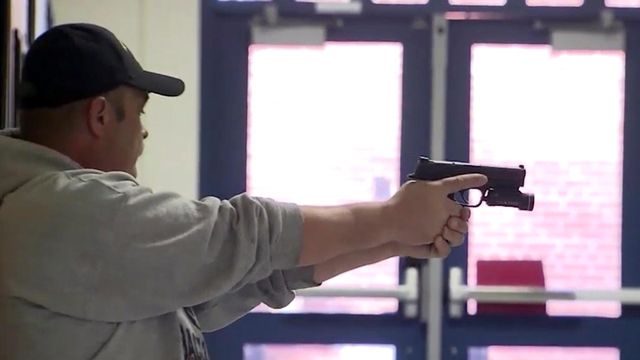Lawmakers weigh options on making NC schools safer
Five weeks after a shooting at a Florida high school killed 17 people, North Carolina lawmakers gathered Wednesday to begin devising legislation to improve security at schools across the state.
Posted — UpdatedLawmakers said they are looking at everything from limiting access to schools to putting cameras on school buses, from expanding monitoring of students on suspension to providing more psychological help to students, from standardizing training for school resource officers to standardizing floor plans for schools.
"Threats to our schools are an appalling reality that we have to confront," Moore said. "You in this committee are being tasked with making decisions on behalf of the children who might feel scared to go to school. Students are asking their loved ones if they're safe, if their classrooms are a place that they can learn and be free of fear. We owe it to our students in North Carolina to make schools a space where students and educators can excel and not have to worry about other matters."
Local and state law enforcement officials spent much of the morning updating lawmakers on efforts already in place to make schools safer, such as installing panic buttons in school offices, giving authorities access to school floor plans creating an app for students to report potential threats.
"Keeping schools safe is not a one-size-fits-all proposition," said Kym Martin, executive director of the North Carolina Center for Safer Schools, which was created in the wake of the December 2012 mass shooting at Sandy Hook Elementary School in Connecticut. "There's not one single measure you can put into place that will magically transform a school into the sanctuary for learning that our students deserve."
Elliott Smith, acting special agent in charge of the State Bureau of Investigation, said a gun safety group has reported that a school shooting has occurred once a week, on average, across the U.S. in the past five years. On Tuesday, a high school student in Maryland shot two of his classmates before being shot by a school resource officer.
Bomb threats Tuesday also locked down some schools in Wake Forest and led to evacuation at Halifax Community College.
Jim Deni, a psychology professor at Appalachian State University and president of the North Carolina School Psychologists Association, told lawmakers they need to provide more mental health support, noting that about 20 percent of people have mental health problems and that school counselors and psychologists are overwhelmed.
"We have to have a balanced approach between psychological safety and physical safety," Deni said.
Clayton High School student Riley Barnes, a member of the state Task Force for Safer Schools, urged lawmakers to reject the idea of arming teachers, saying "it's not under their job description to be security guards." Rather, she called for a more holistic approach to school safety.
"No student should ever feel unsafe in their sanctuary of education. No teacher should have to be in fear at their workplace," Barnes said.
Caroline Daily, an eighth-grade teacher in Johnston County and vice chairwoman of the Task Force for Safer Schools, said the easiest step is also free – improved communication between teachers and students would prevent the social isolation that tends to be a common denominator among school shooters.
Daily cited a program she started two years ago in which teachers meet weekly with small groups of students to talk about their lives and reinforce positive behaviors, such as integrity and responsibility. The meetings help teachers spot problems before they get too big while giving the older students an opportunity to develop leadership skills, she said.
"You might think to yourself, 'Well, this is common sense.' Absolutely it is, but we haven't been teaching it in schools," she said. "We expect them to know it, but I don't really know where they're supposed to learn it.
"At some point, education and our ability to take these tests at the end of the year – pardon me if I do say so – needs to take a back seat sometimes," she added. "We actually need to talk to these kids because nobody else is."
Related Topics
• Credits
Copyright 2024 by Capitol Broadcasting Company. All rights reserved. This material may not be published, broadcast, rewritten or redistributed.






